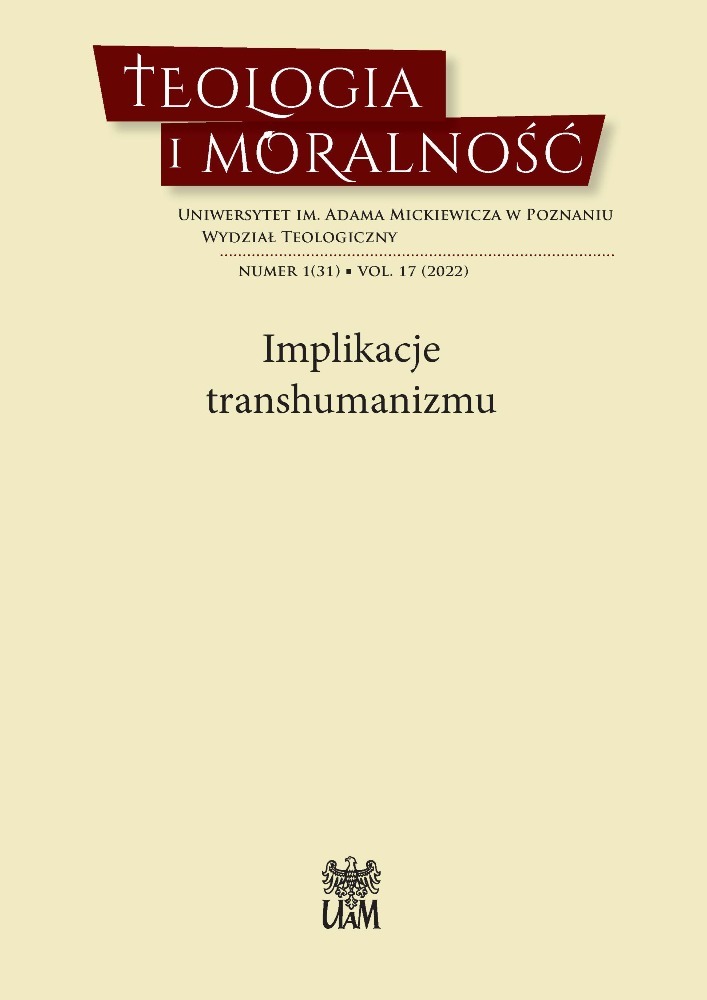Abstract
The aim of this article is to analyze the points of contact (and conflict) between transhumanist thought and theology. Four ideas will be addressed. The first is the idea of progress. Theology indicates that progress, which is strongly emphasized in the publications of transhumanist authors, can nevertheless be ambivalent. Its value turns out only within the framework of analyzing the goals, and thus also the effects of changes proposed by transhumanists in the area of human nature – which is the second idea analyzed in the article. The third concerns the very concept of man, which in transhumanism, unlike theology, does not carry any normative potential. Finally, the last idea is the reference to the Creator. By rejecting the Creator, but also religion as a historical brake and source of ignorance, transhumanism takes on the characteristics of religion itself. Even if one cannot deny transhumanists the noble intention of improving human existence and making humans happy, theology is critical of both the premises on which their visions are based and the methods by which they intend to realize them.
References
Bieri, Peter. 2007 4. Einleitung. W: Analytische Philosophie des Geistes, red. Peter Bieri, 31-55. Weinheim-Basel: Beltz Verlag.
Bostrom, Nick. 2005a. Transhumanist values. Journal of Philosophical Research, 30, 3-14.
Bostrom, Nick. 2005b. In defense of posthuman dignity. Bioethics 19, (3), 202-214.
Bostrom, Nick. 2008. Letter from Utopia. Journal in Ethics, Law, and Technology, 2.1, art. 6, 1-7. DOI: 10.2202/1941-6008.1025.
Bugajska, Anna. 2018. „Religia” ulepszania człowieka: Od evantropii do nieśmiertelności. W: Ulepszanie człowieka. Perspektywa filozoficzna, red. Grzegorz Hołub i Piotr Duchliński, 261-279. Kraków: Wydawnictwo Naukowe Akademii Ignatianum.
Całus, Krzysztof. 2018. Transhumanizm - wizja nowego człowieka. Studia z Historii, 4(9), 237-255.
Chyrowicz, Barbara. 2015. Bioetyka. Anatomia sporu. Kraków: Znak.
Dawkin s, Richard. 2007. Bóg urojony, tłum. Piotr J. Szwajcer. Warszawa: CiS.
Duchliński, Piotr. 2018. Transhumanistyczny obraz świata. Próba spojrzenia na całość. W: Ulepszanie człowieka. Perspektywa filozoficzna, red. Grzegorz Hołub i Piotr Duchliński, 281-299. Kraków: Wydawnictwo Naukowe Akademii Ignatianum.
Elger, E. Christian et al. 2004. Das Manifest. Elf führende Neurowissenschaftler über Gegenwart und Zukunft der Hirnforschung. Gehirn&Geist, 6, 30-37.
Falenczyk, Marian. 2018. Transhumanizm czy humanizm? Krytyczne spojrzenie na nową ideologię. Studia Teologiczno-Historyczne Śląska Opolskiego, 38(1), 243-263.
Garbowski, Marcin. 2015. Transhumanizm. Geneza - założenia - krytyka. Ethos, 28(3), 23-41.
Gunia, Artur Tomasz. 2015. Koncepcje wzmocnienia poznawczego. Próba definicji oraz przegląd metod. Avant, 2, 35-56.
Habermas, Jürgen. 2005. Zwischen Naturalismus und Religion. Philosophische Aufsätze, Frankfurt am Main: Suhrkamp.
Harari, Yuval Noah. 2017. Homo Deus. A Brief History of Tomorrow. London: Vintage.
Harari, Yuval Noah. 2019. 21 Lessons for the 21st Century. London: Vintage.
Heller, Michał. 2019. Nauka i teologia. Niekoniecznie tylko na jednej planecie. Kraków: Copernicus Centre Press.
Hołub, Grzegorz. 2015. Transhumanizm a koncepcja osoby. Ethos 28(3), 83-94.
Huxley, Julian. 1957. Transhumanism. Ethics in Progress 6(1), 12-16.
Jan Paweł II. 1993. Encyklika „Veritatis splendor”. Tekst i komentarze.
Jonas, Hans. 1996. Zasada odpowiedzialności. Etyka dla cywilizacji technologicznej. Kraków: Platan.
Kraj, Tomasz. 2010. Granice genetycznego ulepszania człowieka. Teologiczno-moralny problem nieterapeutycznych manipulacji genetycznych, Kraków: Dante Media.
Müller, Gerhard Ludwig. 2015. Dogmatyka katolicka, tłum. Wiesław Szymona. Kraków: Wydawnictwo WAM.
Nagel, Thomas. 2007. Wie ist es, eine Fledermaus zu sein?. W: Analytische Philosophie des Geistes, red. Peter Bieri, 261-275. Weinheim-Basel: Beltz Verlag.
Pearce, David. 2012. The Biointelligence Explosion. How recursively self-improving organic robots will modify their own source code and bootstrap our way to full spectrum Superintelligence. W: Ammon H. Eden et al., Singularity Hypotheses: A Scientifi c and Philosophical Assessment, 199-238. Heidelberg: Springer.
Porter, Allen. 2017. Bioethics and transhumanism. Journal of Medicine and Philosophy, 42, 237-260.
Rager, Günter. 2007. Ich und mein Gehirn. W: Hirnforschung und Menschenbild. Beiträge zur interdisziplinären Verständigung, red. Adrian Holderegger et al., 153-164. Basel: Schwabe Verlag.
Rager, Günter. 2017. Mensch sein. Grundzüge einer interdisziplinären Anthropologie. Freiburg–München: Verlag Karl Alber.
Ratzinger, Joseph. 2018. Zbawienie i historia. W: Joseph Ratzinger Opera omnia, t. 9-1: Wiara w Piśmie i tradycji, 463-484. Lublin: Wydawnictwo KUL.
Roth, Gerhard. 2004. Wir sin d determiniert. Die Hirnforschung befreit von Illusionen. W: Hirnforschung und Willensfreiheit. Zur Deutung der neuesten Experimente, red. Christian Geyer, 218-222. Frankfurt am Main: Suhrkamp.
Schockenhoff, Eberhard. 2007. Wie frei ist der Mensch? Zum Dialog zwischen Hirnforschung und theologischer Ethik. W: Hirnforschung und Menschenbild. Beiträge zur interdisziplinären Verständigung, red. Adrian Holderegger et al., 267-278. Basel: Schwabe Verlag.
License
Copyright (c) 2022 Marian Machinek

This work is licensed under a Creative Commons Attribution-NoDerivatives 4.0 International License.

